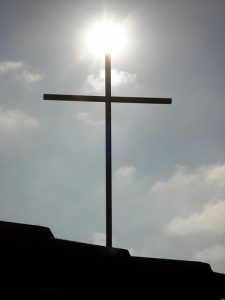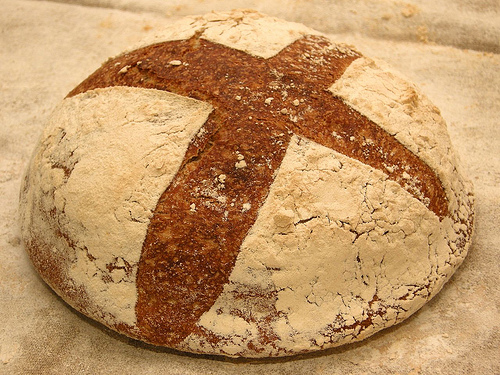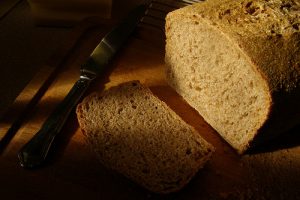25th Sunday after Pentecost Lectionary Reflection
November 11, 2012
The jar of meal was not emptied, neither did the jug of oil fail, according to the word of the Lord that he spoke by Elijah. I Kings 17:16
A poor widow came and put in two small copper coins, which are worth a penny. 43 Then he called his disciples and said to them, “Truly I tell you, this poor widow has put in more than all those who are contributing to the treasury. Mark 12:42-43
Minimalism is a growing lifestyle trend. Type the word into a Yahoo search box and you’ll get more than nine million hits. Narrow your search to ‘minimalist lifestyle” and you’ll still get more than 27,000 hits. Why the sudden emphasis on de-cluttering one’s life, one’s home, one’s mind, and one’s schedule? Is it simply a fad, or is there something else fueling this desire to simplify? Could it be that the speed with which our culture hurtles through life is simply becoming unmanageable for some? Is it possible that others are simply tired of being scattered and smothered like an order of Waffle House hash browns? What if less really is more?
I think this last question gets to the heart of the matter, and both the Old Testament and Gospel lessons for this week offer, at least tangentially, an answer. Both lessons feature widows in key roles. Widows in the days of the prophets and in the first century were a marginalized population. Without the support of a husband, adult son, or extended family they were vulnerable. Poverty was often their lot. In fact, the widow at Zarephath was so desperate that she was out gathering firewood for a last supper when she met Elijah. She and her young son were on the brink of starvation.
Elijah tells her not to be afraid and asks for hospitality in the form of water and a small cake of bread. What does she have to lose? The widow complies, giving out of her poverty. She gives all that is left on the word of a stranger–an odd sort of promise–and she is blessed. By giving all, she always has from that point forward.
Likewise, the widow in Mark’s gospel is putting all that she has in the temple treasury. Her act goes unnoticed by most; after all, two small coins is nothing compared to the lavish gifts of the rich and righteous. But Jesus notices, and he takes full advantage of this teaching moment with his disciples. Little do they know that he is about to give all that he  has for the sake of the world.
has for the sake of the world.
The actions of both widows seem foolhardy, even crazy, to twenty-first century ears. Why would a poor woman give everything she has and risk starvation? What’s the point of giving when you have nothing left to give? Who sitting in the pews this Sunday would literally give everything they possess, putting it all in the hands of the church or giving it to a random stranger they meet in the parking lot of the grocery store? What kind of wise stewardship is that?
Perhaps there’s more to these stories than meets the eye, more than money, bread, and oil in the balance. Jesus is trying to teach his disciples about where to put their faith, their trust, and their absolute fidelity. He’s spending a good deal of precious time attempting to explain to them that his ways are not the ways of the world. His path is not the one that leads to power and might. Yet following Jesus is THE way to experience abundant life forever. Discipleship is about much more than two coins in the collection or one last meal before you cash in the chips.
What Jesus is getting at is the removal of anything that stands between us and his love. Perhaps it is the seeming security of the contents of our kitchen pantry or our earning power or even control over how we spend and give.
 What would it look like for us as Christians to be the equivalent of these biblical era widows? How can we experience utter and complete reliance on God for every breath we take? After all, everything we have is gift. We do not really own anything but are entrusted with the management of the goodness and abundance of the Creator. My suspicion is that if we gather together as the Body of Christ and trust that the our jug of oil and jar of meal will not turn up empty then we will see and experience amazing things. God is good, and in God’s economy less is indeed more–less reliance on the self yields a more abundant life. I double-dog-dare you to try it!
What would it look like for us as Christians to be the equivalent of these biblical era widows? How can we experience utter and complete reliance on God for every breath we take? After all, everything we have is gift. We do not really own anything but are entrusted with the management of the goodness and abundance of the Creator. My suspicion is that if we gather together as the Body of Christ and trust that the our jug of oil and jar of meal will not turn up empty then we will see and experience amazing things. God is good, and in God’s economy less is indeed more–less reliance on the self yields a more abundant life. I double-dog-dare you to try it!
In Worship
Consider a “contrapuntal sermon” for this Sunday. weaving word and hymnody. Use the hymn “Take My Life, That I May Be” as the basis (use either the traditional or Spanish version, ELW 685 or 583) and invite the congregation to sing verses in between your main points. Of particular note with the Gospel lesson is the verse “Take my silver and my gold, not a mite would I withhold; take my intellect, and use every power as thou shalt choose.” Focus on the “mites” that we do withhold from God–anything that separates us from full discipleship and reliance. If you have access to projection capabilities, consider accompanying this sermon with visual elements, too.
With Youth
How about focusing on Psalm 146 with youth this week? You might divide youth into groups to come up with a creative way to present the psalm–drama, a PowerPoint, art, etc. You might challenge them to write their own version of this psalm, updating it to reflect their life contexts. Consider presenting the results as part of a worship service. In what ways are the praise psalms like contemporary praise hymns that are popular in worship? In what ways are they different, if at all? Why is praise an important part of worship?
With Children
Why not write Jesus a thank you note today? Think about it. We write thank you notes whenever we’re grateful for a gift or when someone does something really nice. Jesus has definitely done many, many nice for us and has given us a gift unlike any other–the promise of life with him forever. So why not thank him for something he has done for you or your family or the world?
Create a large greeting card from a folded in half poster board. Decorate it nicely and invite the children to think of reasons to say thank you to Jesus (little ones may need help) and then have them sign it. Place the card in a location where the congregation can also add their thanks during the Passing of the Peace or after worship. Keep the card displayed through Christ the King Sunday as a reminder that we need to be constantly thankful of all God has done for us, especially through Jesus.
Photos by Jarkko Laine, treehouse1977, mullica, and Justin Marty. Thanks!





Leave a Reply